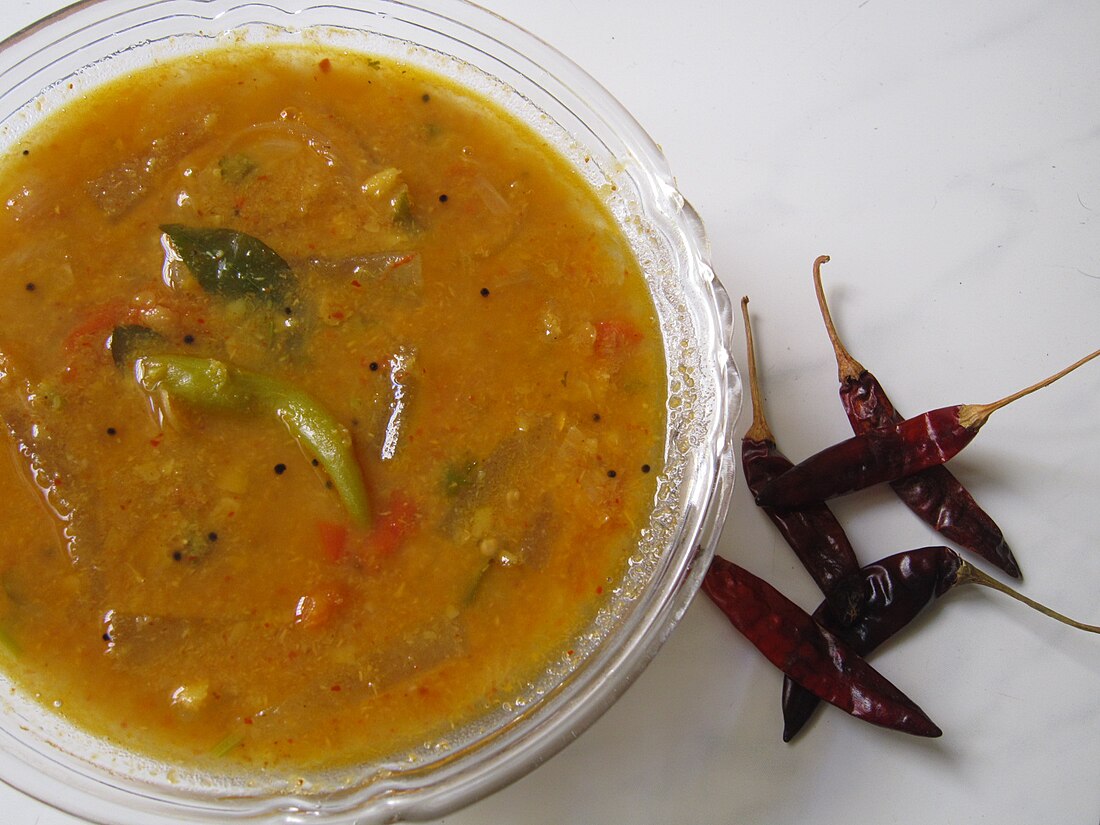Sambar (dish)
Lentil stew From Wikipedia, the free encyclopedia
Sāmbār is a lentil-based vegetable spiced curry or stew, cooked with pigeon pea and tamarind broth. It originates in South Indian cuisine and is popular in other parts of India.
 | |
| Type | Spiced curry stew |
|---|---|
| Place of origin | India |
| Region or state | South India |
| Serving temperature | Hot |
| Main ingredients | Tamarind broth, lentils, vegetables |
| 139 kcal (580 kJ) | |
History
Summarize
Perspective
The recorded history of Sambar is vague.[1] According to food historian K. T. Achaya, the earliest extant reference to sambar, as "huli", can be dated to the 17th century in present-day Karnataka.[2][3] Kanthirava Narasaraja Vijaya, a 1648 text by the Kannada scholar Govinda Vaidya, mentions huli (literally "sourness"), a curry similar to the modern sambar, made with vegetables and toor dal.[1]
According to a legend, Sambar was first made in the Thanjavur Maratha kingdom during the reign of Shahuji I (r. 1684–1712).[1] The legend states that during a visit by Sambhaji, a king or his royal chef substituted kokum with tamarind in the traditional amti (lentil soup), and added some vegetables to it: the resulting curry was named sambar or sambhar after Sambhaji.[4][5] Sourish Bhattacharyya, in The Bloomsbury Handbook of Indian Cuisine (2023), notes that the fathers of Shahuji I and Sambhaji were half-brothers and not on good terms, which reduces the credibility of this legend. However, Bhattacharyya adds that it is possible that Shahuji named the dish after Sambhaji as part of his attempts to establish cordial relations between the two families.[1]
Sambar was introduced to Sri Lankan cuisine in the 20th century, along with many other South Indian dishes.
Regional variations
In southern states of India namely Karnataka, Andhra Pradesh, Telangana, Kerala and Tamil Nadu, Sambar is made using different vegetables along with lentils or coconut. Each region has its own version of making sambar, even though the same vegetables are used, the condiments and ingredients, and the method differ regionwise.[6] In Tulu speaking areas of coastal Karnataka coconut is predominantly used to prepare Koddel (Sambar), The grated coconut is ground with spices to form a paste which is added to vegetables boiled.[7] In Kannada speaking regions sambar is referred to as Saaru.[8][9]
See also
References
Wikiwand - on
Seamless Wikipedia browsing. On steroids.
